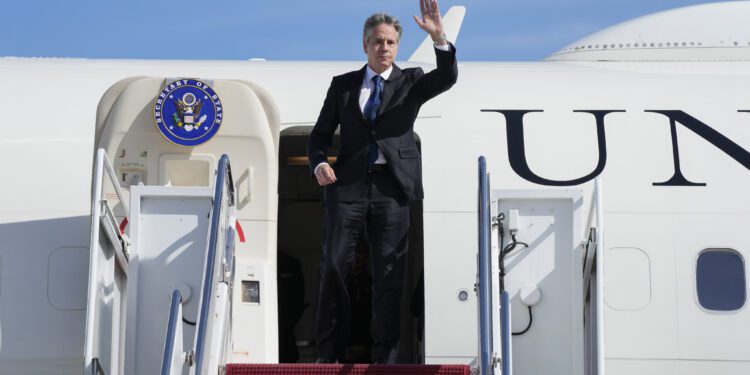The United States Secretary of State, Antony Blinken, has arrived in Israel for potentially challenging discussions with Israeli leaders and officials who have exhibited resistance to Washington’s pressure concerning their conduct in the conflict with Hamas. Blinken, having recently concluded talks with Saudi Crown Prince Mohammed bin Salman in AlUla, embarked on a Middle East tour to establish a consensus on the future of Gaza.
During his visit, Blinken announced that key Arab states, along with Turkey, have reached an agreement to initiate planning for the reconstruction and governance of Gaza once Israel concludes its military operations against Hamas. Specifically, Saudi Arabia, Jordan, Qatar, the United Arab Emirates, and Turkey have committed to collaborative efforts and coordination to assist Gaza in stabilizing and recovering. The primary objectives include charting a political path forward for the Palestinians and working toward long-term peace, security, and stability in the broader region.
Secretary of State Antony Blinken emphasized the ongoing interest among Saudi and other Arab leaders in pursuing the normalization of relations with Israel, contingent upon the establishment of a lasting Israeli-Palestinian political settlement. Blinken acknowledged the necessity for a resolution in Gaza and a viable pathway to a Palestinian state. During his fourth visit to the Middle East in three months, Blinken aims to persuade Israeli Prime Minister Benjamin Netanyahu to engage in substantive discussions on postwar governance in Gaza, enhance civilian protection, and facilitate increased humanitarian aid access to the territory.
Blinken stressed the imperative for Israel to take additional measures to safeguard civilians and ensure the effective distribution of humanitarian assistance. The Biden administration is also committed to addressing the recovery of remaining American, Israeli, and other hostages in Gaza. Despite steadfast U.S. support for Israel during the recent conflict with Hamas, Netanyahu’s reluctance to publicly outline governance plans for Gaza and rejection of the U.S.-preferred option of a unified Palestinian state comprising the West Bank and Gaza have strained relations.
U.S. officials have drafted comprehensive plans for the transition to a unified Palestinian state, but Netanyahu’s government has yet to engage in meaningful discussions on these proposals. The Israeli offensive was launched in response to Hamas sending militants into southern Israel, resulting in casualties and abductions. Tensions escalated further with an Israeli airstrike in southern Lebanon, targeting a Hezbollah commander, contributing to an intensifying exchange of strikes along the border and heightening concerns about the potential for broader conflict in the region amid the ongoing Gaza hostilities.
The Israeli Defense Forces (IDF) reported the killing of a Hamas commander, Hassan Akasha, in Beit Jinn, a Syrian-controlled area near the Golan Heights. The IDF described Akasha as a central figure in launching rocket attacks against Israel. The health ministry in Gaza, under Hamas control, reported 249 deaths in the previous 24 hours, bringing the total to over 23,000 deaths, mostly women and children, since the conflict began.
Jordan’s King Abdullah, speaking in Rwanda, criticized Israel for creating a generation of orphans through its “brutal” war in Gaza, claiming over 30,000 people, mostly women and children, were killed or missing. Analysts emphasize the need for urgent planning to avoid a prolonged conflict, with regional powers playing a crucial role in Gaza’s governance post-war.
US Secretary of State Antony Blinken is visiting the region, attempting to address the escalating tensions. Israeli officials signaled concessions, including a shift in military tactics, while the US emphasizes revitalizing the Palestinian Authority’s control over Gaza. The situation has heightened concerns about regional destabilization, with conflicts flaring in the West Bank, Syria, Iraq, and along the Lebanon-Israel border, including clashes with Hezbollah.
Recent events include the assassination of a senior Hamas official in Beirut, escalating clashes between Israel and Hezbollah, and the killing of an elite Hezbollah commander in southern Lebanon by an Israeli airstrike. Israel expressed reluctance for a war with Hezbollah but asserted readiness to push the organization’s elite fighters away from the disputed border.
UN experts raised concerns about sexual violence against Israeli civilians during the conflict, with evidence described as “harrowing.” Hamas denies the accusations. Additionally, the UN expressed alarm over the number of journalists killed in the Gaza war, following the deaths of two Al Jazeera reporters in an Israeli strike, referred to by the network as a “targeted killing.”
















